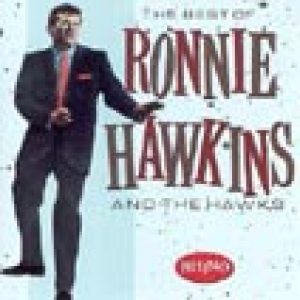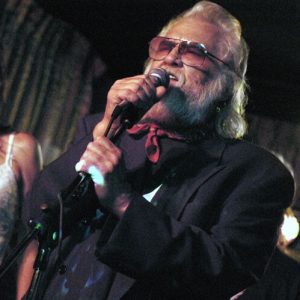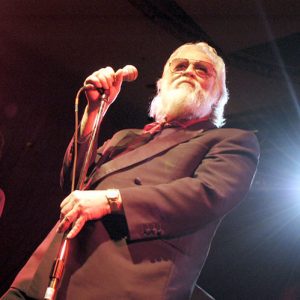calsfoundation@cals.org
Ronnie Hawkins (1935–2022)
aka: Ronald Cornett Hawkins
Ronald Cornett (Ronnie) Hawkins, a rock and roll singer and bandleader, was known primarily for starting the group the Hawks, which later became the Band.
Ronnie Hawkins was born on January 10, 1935, in Huntsville (Madison County). His father, Jasper Hawkins, was a barber, and his mother, Flora Cornett Hawkins, was a schoolteacher. In 1945, the family, which included Hawkins’s older sister Winifred, moved to Fayetteville (Washington County). Hawkins was educated in the city’s public schools, graduating from Fayetteville High School in 1952. During his high school and college years, Hawkins formed his first bands, which played such Fayetteville venues as the Tee Table, the Bubble Club, and the Shamrock Club. A physical education major at the University of Arkansas (UA) in Fayetteville, he developed an outrageous stage persona that earned him such nicknames as “Rompin’ Ronnie” and “Mr. Dynamo.” His camel walk predated Michael Jackson’s moonwalk by three decades, and his back flips became an integral part of his live act.
Hawkins did not complete college. Instead, he joined the army and was stationed at Fort Chaffee in Fort Smith (Sebastian County) and Fort Sill, Oklahoma. After finishing his service, he moved to Helena (Phillips County), where he put together a touring band that included Levon Helm of Marvell (Phillips County) on drums. At the suggestion of Harold Jenkins (later known as country and western star Conway Twitty), the group headed for Canada in 1958.
Hawkins referred to Canada as “my promised land” upon being embraced there by an audience hungry for authentic American rock and roll. Always on the lookout for talented players to mold into Hawks, he assembled between 1958 and 1961 a roster that included Rick Danko, Garth Hudson, Richard Manuel, and Robbie Robertson, who, along with Helm, would back Hawkins until 1963, when they left to tour with Bob Dylan. Eventually, the quintet would name itself the Band and record such classics as “The Night They Drove Old Dixie Down,” “Up on Cripple Creek,” and “The Shape I’m In.” The Last Waltz, Martin Scorsese’s 1978 documentary, captures the group at its zenith, backing a diverse assemblage of artists, including Eric Clapton, Joni Mitchell, Neil Diamond, and their old mentor Hawkins, whose version of Bo Diddley’s “Who Do You Love?” was one of the film’s highlights.
During his long career, Hawkins had only two hit records in America. In 1959, “Forty Days,” his reworking of Chuck Berry’s “Thirty Days,” and his version of Young Jesse’s “Mary Lou” reached No. 45 and No. 26, respectively, on the U.S. charts. He fared much better in Canada, where he earned the 1982 Juno Award, equivalent to an American Grammy, as Best Male Country Vocalist. In 1996, he was presented the Walt Grealis Special Lifetime Achievement Award, one of the most esteemed honors in the Canadian music industry. The city of Toronto proclaimed October 4, 2002, “Ronnie Hawkins Day.” Hawkins was added to Canada’s Walk of Fame in 2002 and inducted into the Canadian Music Industry Hall of Fame in March 2004.
In addition to appearances as himself in The Last Waltz and Renaldo and Clara (1978), Hawkins had minor dramatic roles in several motion pictures, including Michael Cimino’s Heaven’s Gate (1980). He hosted his own variety series, Honky Tonk, on Canadian television during the 1981–82 season. In 2004, he made a guest appearance on the Billy Ray Cyrus series Doc.
Hawkins and his wife Wanda made their home in Peterborough, Ontario, Canada. They had three children: Ronnie Jr., Robin, and Leah. In 2002, Hawkins was diagnosed with pancreatic cancer and was not expected to survive. But he defied the odds and recovered fully. In 2002, he released a new album, Still Cruisin’, to favorable reviews. He was inducted into the Arkansas Entertainers Hall of Fame in 2008. In 2014, he was named a member of the Order of Canada.
Hawkins died on May 29, 2022, after an illness.
For additional information:
Applebome, Peter. “Ronnie Hawkins, Rockabilly Road Warrior, Is Dead at 87.” New York Times, May 29, 2022. https://www.nytimes.com/2022/05/29/obituaries/ronnie-hawkins-dead.html (accessed July 11, 2023).
Bowden, Bill. “Singer from ’50s, ’60s Regales Crowd.” Arkansas Democrat-Gazette, August 23, 2019, pp. 1A, 6A.
Chatto, James. “The Hawk Is 60.” Arkansas Times, August 25, 1995, pp. 14–15.
Cochran, Robert. “Long on Nerve: An Interview with Ronnie Hawkins.” Arkansas Historical Quarterly 65 (Summer 2006): 99–116.
Iorfida, Chris. “Ronnie Hawkins, Musician Who Called Canada Home and Mentored the Band, Dead at 87.” CBC News, May 29, 2022. https://www.cbc.ca/news/entertainment/ronnie-hawkins-obituary-1.6470162 (accessed July 11, 2023).
“‘Mr. Dynamo’: Remembering Canadian Legend Ronnie Hawkins.” CBC Radio, May 30, 2022. https://www.cbc.ca/radio/ideas/mr-dynamo-remembering-canadian-legend-ronnie-hawkins-1.6470796 (accessed July 11, 2023).
Sellars, Jeff, and Kevin C. Neece, eds. Rags and Bones: An Exploration of The Band. Jackson: University Press of Mississippi, 2022.
Wallis, Ian. The Hawk: The Story of Ronnie Hawkins and the Hawks. Kingston, Ontario: Quarry Music Books, 1997.
Thomas Cochran
Fayetteville, Arkansas







Comments
No comments on this entry yet.